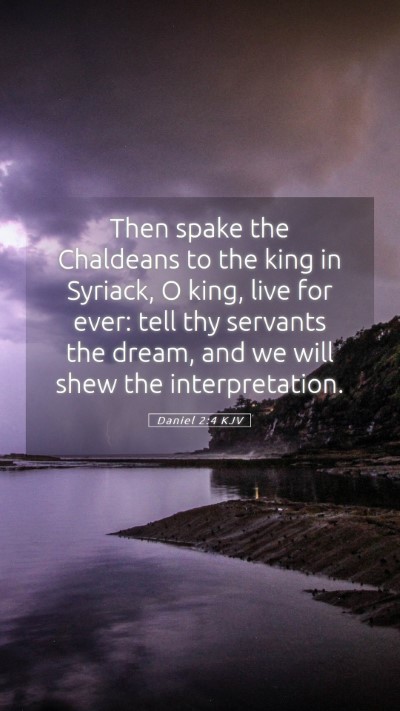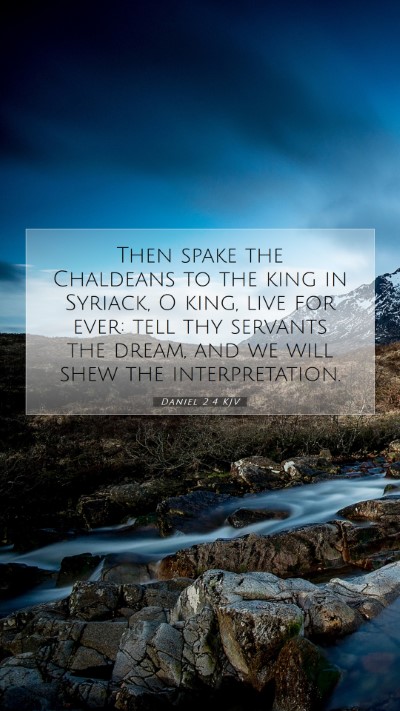Understanding Daniel 2:4: A Comprehensive Commentary
In Daniel 2:4, the narrative details the beginning of a significant exchange between King Nebuchadnezzar and his wise men, marking a pivotal moment in the Book of Daniel. This verse serves as an introduction to the unfolding events surrounding Nebuchadnezzar's troubling dream. Through various public domain commentaries, we gain deeper insights into its meanings and implications.
Verse Context
Daniel 2:4 states: "Then spake the Chaldeans to the king in Syriack, O king, live for ever: tell thy servants the dream, and we will show the interpretation." This verse highlights the Chaldeans, wise men from the Babylonian court, who respond to the king's command. Their address reflects both respect and the urgency of their task.
Insights from Matthew Henry
Matthew Henry emphasizes the political and spiritual dynamics at play in this chapter. He notes that the Chaldeans, representing Babylon’s learned men, exhibit their reliance on ancient wisdom and pagan practices to interpret the king's dream. Their request for the dream itself underscores a lack of true prophetic insight, contrasting their methods with Daniel's faith in God.
Albert Barnes' Commentary
Albert Barnes offers a thorough examination of the cultural context, pointing out that the Chaldeans' introduction in Syriack indicates a transition in the narrative's tone. It suggests a shift from the broader audience to a personal dialogue with the king. Barnes comments on their flattering language, which aims to ingratiate themselves with Nebuchadnezzar and emphasizes their willingness to serve him, which is emblematic of courtly behavior in ancient monarchies.
Adam Clarke's Analysis
Adam Clarke provides a linguistic perspective, examining the use of the phrase "tell thy servants the dream." He explains that the request implies not only a demand for the dream but also signals the inadequacy of the Chaldeans' capabilities if they cannot know the dream without Nebuchadnezzar’s help. Clarke’s insight highlights the tension between the king's authority and the limitations of the wise men's powers.
Thematic Elements
Several key themes emerge from Daniel 2:4, including:
- The Limits of Human Wisdom: The Chaldeans’ inability to interpret dreams without prior revelation illustrates the limitations of human understanding and the necessity of divine insight.
- Authority and Power: The king’s command establishes a scene of authority, revealing the importance of leadership and governance in ancient times.
- Faith Versus Folly: The contrast between worldly wisdom and divine wisdom becomes evident as the narrative unfolds, setting the stage for Daniel’s eventual revelation from God.
Application of the Verse
For modern readers, Daniel 2:4 prompts reflection on our own reliance on human wisdom versus spiritual guidance. In times of confusion or uncertainty, this verse encourages believers to seek God for understanding rather than relying solely on human interpretations. It serves as a reminder of the significance of prayer and seeking divine revelation in our lives.
Cross References
This verse connects with several other scriptural passages that enhance its meaning and narrative flow:
- Daniel 1:17 - God's provision of wisdom to Daniel and his friends.
- Daniel 2:10-11 - The Chaldeans’ proclamation of their limitations.
- 1 Corinthians 1:19-21 - God's wisdom compared to human wisdom.
Conclusion
Daniel 2:4 serves as a foundational verse in the Book of Daniel, illustrating the tension between earthly powers and divine insight. Through comprehensive study, including insights from prominent commentaries, we uncover the deeper meanings of the text, encouraging a richer understanding of God’s authority and wisdom throughout history and into our personal lives today.


